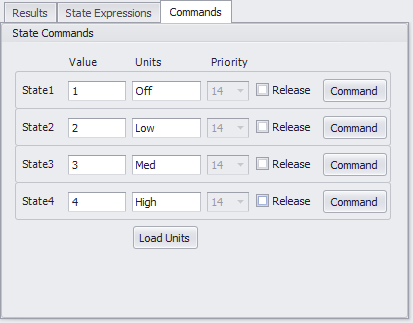
In the Commands tab, the command value, units, and priority can be set for each state defined.

|
Field Name |
Description |
Range |
|
Value |
Value to send for a particular state. This |
Value must be appropriate for the object type used. |
|
Units |
State text based on the object type selected. For multistate objects, the “state_text” property is used. For binary objects, the “Inactive_Text” and “Active_Text” are used, and for analog objects, “units” are used. |
|
|
Priority |
Priority value for commanding an object. |
1-16 (1=highest) 16 = recommended default Only applies to Present_Value property on commandable objects (ie. AO, AV, BO, BV, MSO, MSV) |
|
Release |
The Release checkbox allows a state to release its priority instead of sending a value.
|
Default = unchecked. |
The Default Unoccupied State combo box in the sets the state that represents OFF or UNOCCUPIED when no events are present. Make sure you set the appropriate OFF value for this state.
The Default No Match State selects which state will be used when there are events that don’t match any of the state expressions. This will be the failsafe state when an event doesn’t match any of the state criteria.
Load Units
The Load Units button will attempt to populate the units field for each of the states.
Command
The Command button for each state will send a BACnet command using the command value/priority to allow you to test each state.
might have undesirable results.